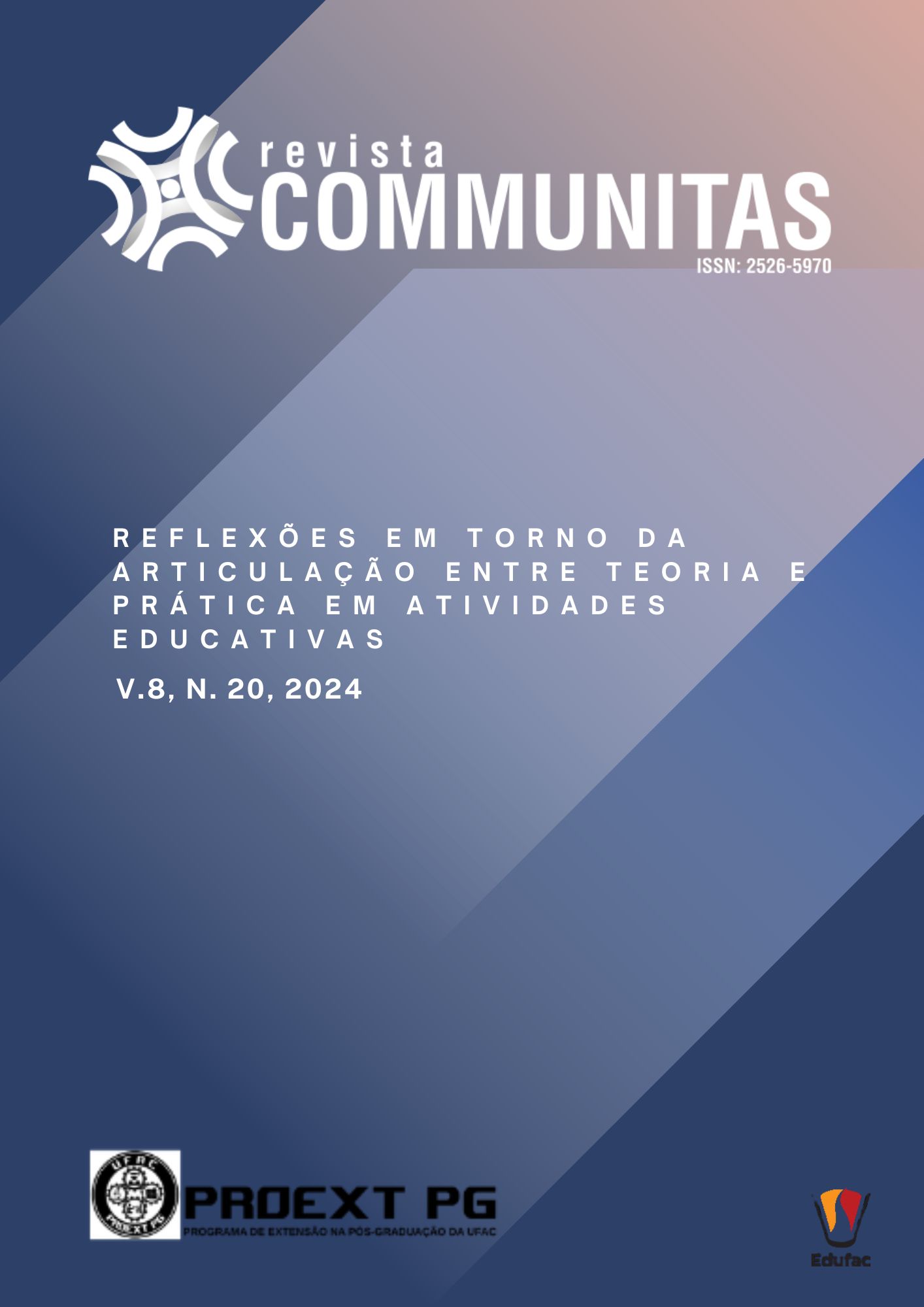GÊNERO E SEXUALIDADE NA EDUCAÇÃO PROFISSIONAL E TECNOLÓGICA
se pretende discutir no IFMA?
DOI:
https://doi.org/10.29327/268346.8.20-8Keywords:
Gênero, Sexualidade, Currículo, IFMA.Abstract
This social investigation aims to identify the presence of discussions of gender and sexuality in the curricular planning of the Federal Institute of Maranhão, based on the assumption that the pedagogical autonomy that underlies the IFs can contribute, in political and training clashes, to the victory of the inclusion of such discussions which constitute crucial contents or themes in integral human formation, which is one of the structuring elements of such institutes. therefore, this qualitative bibliographic research used document analysis as a data collection technique. The discussions of gender and sexuality at IFMA have a curricular character of necessary exceptionality in the sense that they need to be discursively defended for proper institutional alignment with the founding pedagogical concepts of the institution, but their unquestionable need was not enough to transform them into content planned and explicit curricula in each teaching unit.
Downloads
References
BARROS, Roberto Idalino; CAVALCANTI, Ricardo Jorge de Sousa. Diversidade sexual e de gênero no currículo da educação profissional: dizeres das/os estudantes. Revista Humanidades e Inovação v.8, n.53, p. 211-224, 2021. Disponível em: https://revista.unitins.br/index.php/humanidadeseinovacao/article/view/5920. Acesso em: 10 abr. 2024.
BORTOLINI, Alexandre. Pode falar sobre gênero na escola? In: PINHEIRO, Diógenes; REIS, Claudia. Quando LGBTs invadem a escola e o mundo do trabalho. 1. ed. Rio de Janeiro: UNIRIO, 2020.
BORTOLINI, Alexandre. É pra falar de Gênero Sim: Fundamentos legais e científicos da abordagem de questões de gênero na educação. [s.n.] Brasília, 2023. Disponível em: https://eprafalardegenero.wixsite.com/livro. Acesso em 02. mai. 2024.
BUTLER. Judith. Quem tem medo do gênero? OUTRASPALAVRAS, 08 de março de 2024. Seção Feminismos. Disponível em: https://outraspalavras.net/feminismos/judith-butler-quem-tem-medo-do-genero/. Acesso em 10 abr.2024.
BRASIL. Ministério da Educação/Conselho Nacional de Educação. Resolução CNE/CP nº 1, de 5 de janeiro de 2021. Define as Diretrizes Curriculares Nacionais Gerais para a Educação Profissional e Tecnológica. Disponível em: https://www.in.gov.br/en/web/dou/-/resolucao-cne/cp-n-1-de-5-de-janeiro-de-2021-297767578. Acesso em: 10 fev.2024.
CAVALCANTI, Natália Conceição Silva Barros; GEMAQUE, Robelânia dos Santos; NOGUEIRA, Natasha Mendonça. “Eu sou viado, sou gay, sou bichinha, eu sou isso mesmo”: sujeitos da educação profissional e enfrentamentos à cis heteronormatividade. Revista COR LGBTQIA+, v. 1, n.1, p. 29–37, 2021. Recuperado de https://revistas.ceeinter.com.br/CORLGBTI/article/view/491. Acesso em 05, fev. 2024.
FONSECA, Nei; BASSO, Laís; TUBINO, Ana Beatriz. Gênero na Educação Profissional e Tecnológica: resistências para o enfrentamento de opressões. Revista Brasileira Do Ensino Médio, 5(Dossiê especial: "O Ensino Médio Integrado em perspectiva"), p. 61–71, 2022. Disponível em: https://doi.org/10.5281/zenodo.6374602. Acesso em 05 abr. 2024.
IFMA. Instituto Federal de Educação, Ciência e Tecnologia do Maranhão. Resolução nº 35, de 18 de junho de 2019. Institui a política de ações afirmativas do IFMA. São Luís, MA. 18 jun. 2019b.
IFMA. Instituto Federal de Educação, Ciência e Tecnologia do Maranhão. Plano de Desenvolvimento Institucional- 2019-2023. São Luís, MA, 2019. Disponível em: https://caxias.ifma.edu.br/wp-content/uploads/sites/27/2023/03/PDI_2019-2023.pdf. Acesso em 05. abr. 2024.
IFMA. Instituto Federal de Educação, Ciência e Tecnologia do Maranhão. Plano Estratégico 2016-2020. São Luís, MA, 2016. Disponível em: https://planejamentoestrategico.ifma.edu.br/wp-content/uploads/sites/53/2017/01/planoestrategico20162020.pdf. Acesso em 05 abr.2024.
IFMA. Instituto Federal de Educação, Ciência e Tecnologia do Maranhão. Plano Pedagógico Institucional- 2019-2023. São Luís, MA, 2019. Disponível em https://proen.ifma.edu.br/wp-content/uploads/sites/32/2021/02/PPI-1.pdf. Acesso em 05 abr. 2024.
MOURA, Henrique, D; BENACHIO, Costacurta, E. Reforma do ensino médio: subordinação da formação da classe trabalhadora ao mercado de trabalho periférico. Revista Trabalho Necessário, 19(39), 163-187, 2021. Disponível em: <https://periodicos.uff.br/trabalhonecessario/article/view/47479/29251>. Acesso em 09. Mar, 2023.
PEDROSO, Ivan. Educação profissional e tecnológica, gênero e sexualidade: uma sequência didática para o ensino médio integrado. Dissertação (Mestrado em Educação Profissional e Tecnológica) - o Programa de Pós Graduação em Educação Profissional e Tecnológica em Rede Nacional (ProfEPT), o Instituto Federal de Educação, Ciência e Tecnologia de São Paulo, Sertãozinho – SP, 2019. Disponível em: https://sucupira.capes.gov.br/sucupira/public/consultas/coleta/trabalhoConclusao/viewTrabalhoConclusao.jsf?popup=true&id_trabalho=7848121. Acesso em 22 abr. 2024.
SANTOS, Degmar dos; HERINGER, Nídia; WIESE, Iria Raquel Borges; SILVA, Mario Rodrigues da. A rede federal de educação profissional e tecnológica indo além do tecnicismo: um estudo de questões de gênero e relações étnico-raciais nos PDIS. Revista da Associação Brasileira de Pesquisadores/as Negros/as (ABPN), [S. l.], v. 7, n. 17, p. 102–121, 2015. Disponível em: https://abpnrevista.org.br/site/article/view/74. Acesso em: 30 nov. 2023.
RAMOS, M. Nogueira. Ensino Médio Integrado: Lutas Históricas e Resistências em Tempos de Regressão. Educação Profissional e Tecnológica Em Revista, 1(1), 27-49, 2017. Disponível em: https://ojs.ifes.edu.br/index.php/ept/article/view/356/317. Acesso em 09 Mar, 2023.
Downloads
Published
How to Cite
Issue
Section
License
Copyright (c) 2024 Communitas

This work is licensed under a Creative Commons Attribution-NonCommercial-ShareAlike 4.0 International License.
The Copyright for articles published in this magazine belongs to the author, preserving the rights of first publication for the Communitas Magazine. Because they appear in this publicly accessible journal, the articles are free to use, with their own attributions, in educational and non-commercial applications.




























